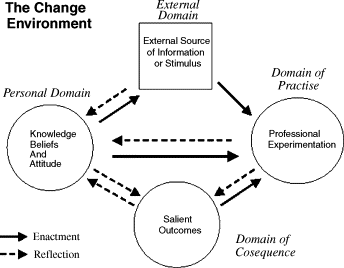Affecting long-lasting improvements in classroom practice through teacher-led action research
05 May 2020

While curricula have shifted in favour of computer science over the last decade, the subject's success lies in the hands of those teaching it. Helping practitioners develop skills to teach computer science is one of the main reasons for the existence of organisations like Computing at School (CAS), and more recently, the National Centre for Computing Education (NCCE). As part of the range of Continuing Professional Development (CPD) offered by the National Centre, educators will soon be able to take part in an action research-focused course, aimed at supporting continuous improvement in the classroom.
As teachers will know and have experienced, significant changes can take time. Sure, we can come away from a training session with many ideas and a few quick wins which can be applied almost the next day. However, adopting new pedagogies, approaches, or assessment strategies requires planning, adaptation, confidence, and engagement. New ideas need to be connected and situated within the educator’s regular working practices.
As a trainer, I’ve worked with educators with a diverse range of needs, priorities, and professional challenges. I’ve come to recognise that alongside great content and experiences, educators need to have agency over their development. Providing such opportunities is crucial for lasting impact.
The best way to think of CPD is as a holistic practice, not restricted to workshops and training courses. With this understanding, we can see that our professional learning can take place through action research-based programmes and be built around other teachers, known as a community of practice. Both can be viewed through a sociocultural lens, which means that the environment and interaction surrounding the CPD plays a key part in the teacher’s learning. In particular, action research connects the learning process with the educator’s regular practice and routines, which the literature describes as a form of situated learning. There is plenty of research to support classroom-based action research as a hugely effective form of CPD. Here are a few examples.
IMPTG Model
In 2002, Clarke and Hollingsworth introduced their Interconnected Model of Professional Teacher Growth (IMPTG), a framework for explaining how educators may develop their practice.

This model identifies four domains within teacher learning as well as connections between them. Crucially there is no direct link between the external domain (CPD, reading, etc.) and the domain of consequence, where we would hope to observe impact in the classroom. Instead (according to the model), impact is driven by the educator’s beliefs, knowledge, and attitude (personal domain), and experimentation in the classroom (domain of practice). While educators may take different routes through this model or be impacted by different interventions, effective CPD should address both the personal domain and domain of practice.
The TICE Project
Back in 2016, the Teacher Inquiry in Computing Education (TICE) project supported a small group of teachers in conducting their own action research projects as a means of CPD. The project and subsequent research paper identified a number of beneficial outcomes, including:
- Individual teacher’s self-efficacy
- Opportunity to develop as a critical self-reflective practitioner
- Development of research skills
- Teaching aspects of computing differently
- Engagement in further professional learning
“Teachers learned a range of new skills in terms of being able to plan and execute a small-scale research project, and their data shows that they gained an understanding of how children learn computing and ways in which deeper learning of computing can be facilitated. This makes it an important approach for computing professional development where teachers can develop an awareness of good pedagogical strategies”.
You can read more about TICE and find the research projects of the participants.
Embracing action research through the NCCE
As part of the National Centre’s range of high-quality CPD,a new online course will soon be available. ‘Improving computing classroom practice through action research’ is a three week course that will be commencing its first run in June. The first two weeks will be open for participants, during which you’ll learn about:
- The fundamentals of educational research
- Framing your own research question
- Planning a research investigation
- Tools to collect and analyse experimental results
- Creating a research action plan
The third and final week will focus on evaluation, presenting and sharing a research project. It will be available from late 2020, to give participants time to conduct their experiments.
Read more
- Clarke, D. & Hollingsworth, H. (2002) Elaborating a model of teacher professional growth. Teaching and teacher education. 18(8), 947-967.
- Sentance, S., Sinclair, J., Simmons, C. & Csizmadia, A. (2018) Classroom-based research projects for computing teachers: facilitating professional learning. ACM Transactions on Computing Education (TOCE). 18(3), 1-26.
Register your interest
The course will be available for registrations soon. In the meantime, you can register your interest.
About the author

James Robinson, Senior Learning Manager (Pedagogy), Raspberry Pi Foundation